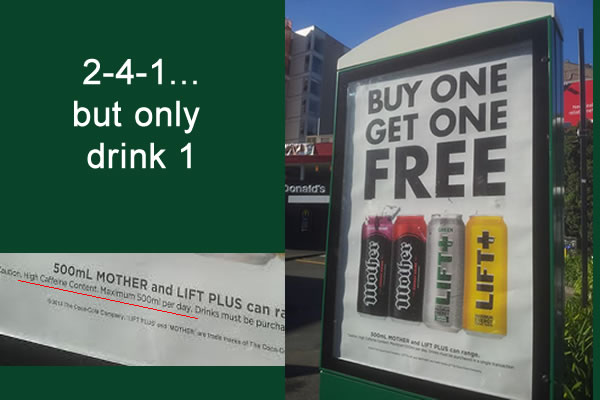The Dirty Tricks Food & Drink Companies Use to Target Your Kids
An angry father has called out Monster energy drinks for their appalling actions in handing out energy drinks to children. He is right in calling for regulation, this is yet another example that the food industry self-regulation over advertising to children is failing. You simply don’t leave the wolf in charge of the chicken coup.
Kids shouldn’t drink this junk
According to the Ministry of Health, children should not consume any energy drinks, due to the caffeine in them. Even adults should be wary, especially given the trend toward larger serving sizes. These drinks also come with a health warning to limit consumption to one a day. This doesn’t stop two for one deals or getting multiple cans at giveaways.
Monster’s Oceania manager has responded claiming “we do not in any way target children with any marketing practices”. Yeah right. Their website is full of teen lexicon, fast cars, skateboards, half naked women and rock music. Teenage boys wouldn’t be into that at all.
Other dirty tricks big companies use
This is just the most obvious example of the obscene marketing tactics of the drinks industry and junk food more broadly. In 2007 a survey showed that 80% of Kiwi parents and grandparents wanted junk food advertising to kids to be banned. In 2008 the industry responded by restricting TV advertising of junk food during ‘children’s programming times’ (afternoon TV).
This was a minor concession by the industry, as it leaves them with most of the guns in their junk food marketing armoury. Here are some other examples that most parents will know well:
- Fast food prizes for sports teams player of the day;
- The clustering of billboard advertising and dairy outlets around schools;
- Sponsorship of sports people and teams;
- Cartoon characters on the packaging of sugary cereals and yoghurts;
- Pushing soft drinks and confectionary for fundraising efforts; and
- And of course we have already talked about the use of toy giveaways, such as the New World ‘Little Shop’ promotion.
We need to regulate advertising to kids
These tactics aren’t bad in themselves – there is nothing wrong with cartoon characters and toys per se. It is their use to push junk food and get into parent’s pockets via their children that is the problem. The food and drink industry are intentionally making it harder for parents to say no to their children – a tactic known amongst advertisers as ‘pester power’.
The food industry’s response is that it is up to parents to decide what their children eat. This ignores the reality of why ‘pester power’ works as an advertising tactic. Parents may be rational, but their kids are not and when the parent is tired it can be a struggle to say no to their kids all the time. We also know that parents start to lose control over what their children eat from age 7 onwards. Is this old enough for kids to be at the mercy of food industry advertising and make up their own mind?
The one token acknowledgement of the risks to children is warning which all energy drinks carry “not recommended for children, pregnant or breastfeeding women or people sensitive to caffeine.” This would carry more credibility if the drink companies asked their suppliers not to serve energy drinks (or their mutant cousin, the caffeine gel) to anyone under 18. Of course, they won’t do that, not without regulation.

